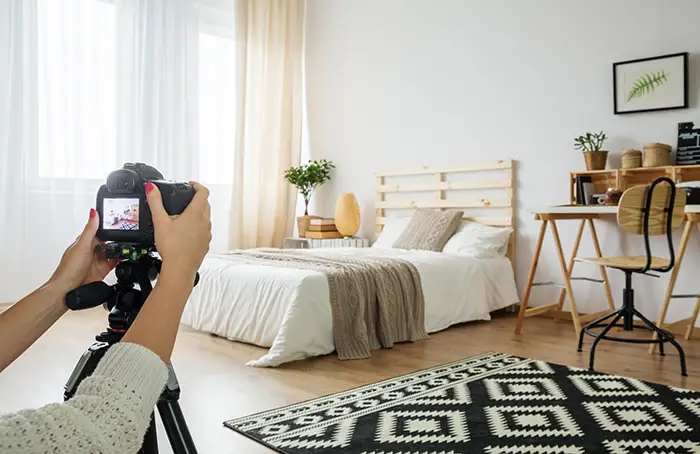Photography Tips to Sell Your Home Quickly
Published on May 29, 2025 | 5 Minute read

Melanie
Ortiz Reyes
Content Specialist
Your home's first impression happens online. With 95% of buyers starting their search on the internet, your photos can make or break a potential sale. Poor photography keeps buyers scrolling past your listing, while great shots get them scheduling showings.
If you're selling your home without an agent, mastering photography becomes even more critical. You're competing against professionally marketed properties, and your photos need to stand out in a crowded market.
The Equipment You'll Need
Camera Options
You don't need a $5,000 camera to take great real estate photos. A smartphone with a decent camera can work, but a DSLR or mirrorless camera will give you more control and better results. If you're borrowing or renting equipment, focus on getting a camera with manual settings.
Accessories
A sturdy tripod is non-negotiable. Camera shake ruins more real estate photos than any other factor. You'll also want a wide-angle lens to capture more of each room. If your camera doesn't have one built-in, consider renting a 10-24mm lens for the shoot.

Preparing Your Home for Photos
Declutter Every Space
Remove personal items, excess furniture, and anything that makes rooms feel cramped. Pack away family photos, religious items, and political materials. The goal is creating a neutral space where buyers can envision their own belongings.
Deep Clean Everything
Dust shows up in photos. Clean windows inside and out, vacuum carpets, mop floors, and wipe down all surfaces. Pay special attention to bathrooms and kitchens where cleanliness is paramount.
Stage for Success
Open all curtains and blinds to let in natural light. Turn on every light in the house. Replace any burnt-out bulbs and make sure all fixtures are working. Fresh flowers or a bowl of fruit can add life to a kitchen counter, but keep decorations minimal.
Room-by-Room Photography Strategy
Living Areas
Position yourself in a corner to capture as much of the room as possible. Include features like fireplaces, built-in shelving, or large windows. Shoot from standing height, not too low or too high. Multiple angles of the same room help buyers understand the layout and flow.
Kitchens and Bathrooms
These are the rooms that sell homes. Capture the full layout in wide shots, then take detailed photos of special features like granite countertops, backsplashes, or custom cabinetry. Make sure all surfaces are spotless and consider adding small staging elements like a coffee mug or folded towels.
Bedrooms
Show the size and layout of each bedroom. Include shots that highlight closet space, windows, and any built-in features. Make beds with neutral bedding and remove personal items from nightstands and dressers.
Outdoor Spaces
Don't forget your yard, patio, or deck. Outdoor living spaces are huge selling points. Mow the lawn, trim bushes, and remove any clutter. Show how the spaces can be used for entertaining or relaxing.
Common Photography Mistakes to Avoid
Crooked Horizons and Vertical Lines
Nothing screams amateur like tilted photos. Use your camera's grid lines or check that doorframes and windows are perfectly vertical.
Including Your Reflection
Mirrors are everywhere in homes. Position yourself carefully and check every reflective surface before shooting. Sometimes you'll need to shoot from unusual angles to avoid reflections.
Poor Composition Choices
Don't cut off important features at the edges of your frame. Include entire furniture pieces rather than chopping off corners. Leave some space around the edges of rooms rather than cramming everything into the frame.
Post-Processing Your Photos
Basic Adjustments
Even great photos need some editing. Adjust brightness, contrast, and color balance to make your images pop.
Creating Your Online Listing
Photo Order Matters
Lead with your best exterior shot. Follow with the most impressive interior space, usually the living room or kitchen. Include 20-25 high-quality photos that tell the complete story of your home. End with outdoor spaces and neighborhood shots if relevant.

The Reality of DIY Real Estate Photography
Taking your own real estate photos is possible, but it requires a lot of time, effort, and often equipment investment. You're competing against listings with professional photography, virtual tours, and drone footage. The learning curve is steep, and mistakes can cost you showings.
Professional real estate photographers understand lighting, composition, and editing techniques that take years to master. They have specialized equipment like wide-angle lenses, professional lighting, and HDR processing software. Most importantly, they know how to make homes look their absolute best.
Why Working with a Real Estate Agent Makes Sense
Real estate agents typically include professional photography as part of their service. They work with photographers who specialize in real estate and understand how to showcase properties effectively. These photographers have the right equipment, know the best techniques, and can often complete a shoot in half the time it would take you.
Beyond photography, agents bring marketing expertise that extends far beyond just taking pictures. They know how to price your home competitively, market to the right audience, and negotiate with buyers. Their professional network includes photographers, stagers, and other service providers who can help your home sell quickly and for top dollar.
The commission you pay an agent often pays for itself through better pricing, faster sales, and professional presentation that attracts more qualified buyers. While selling FSBO might seem like a way to save money, the reality is that most sellers end up with less money in their pocket after accounting for the time invested, marketing costs, and potentially lower sale prices.
Your home deserves a professional presentation in today's competitive market. The investment in professional help typically returns itself many times over through a quicker sale and a better final price.